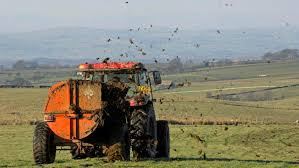Pembrokeshire’s farmers, already badly
hit by plummeting milk prices are about to be hit again, this time with new
regulations on the way they spread slurry on their land. Bear with me on this
question which on the face of it is not one to gladden the heart. But believe
me it has the potential to do enormous harm to farmers and our way of life in
Pembrokeshire.
Every four years the Cleddau river catchment, which covers about
80 per cent of Pembrokeshire’s land area, is tested for nitrates that are
largely caused by farm waste flowing into the water system. If they are too
high they cause the growth of algae and other harmful organisms. In turn this
upsets the fish and plant life that depend on the health of the waters in
Milford Haven and the Marine Special Conservation Area beyond.
When the rivers were last tested in 2012 the nitrate levels
almost reached the point where the Welsh Government would have been obliged to
impose severe restrictions. The farming unions are resigned to this happening at
the beginning of next year. Any day now a 12-week consultation period will be
launched, followed by an appeals period, with restrictions likely to come into
force from January 2017.
If a Nitrates Vulnerable Zone is declared it will have had a
massive impact on the 1,800 Pembrokeshire farms that operate within the river
catchment area. Farmers will be prevented from spreading slurry on their land
between October and February, the winter months when most rainfall occurs. They
will be required to ensure they have a capacity to store six months worth of
slurry produced by their farms. And they will have to keep strict records of
their nitrate discharges.
These new obligations and their costs could
be enough to tip many farm operations, already running desperately close to
going under, over the edge. Irreparable harm would be done, not just to the
lives of the farming families but also to Wales’s agricultural industry. After
all Pembrokeshire produces 25 per cent of the Wales’s dairy output and 50 per
cent of our potato crop.
So what can be done? In the first place
the Welsh Government must produce firm evidence that it is farm slurry that is
the sole cause of the harmful nitrate levels. There could be other contributors,
such as the Pembroke Power Station which abstracts water from the Haven for
cooling, returning it at higher temperatures.
If restrictions are imposed they should
be done voluntarily, in ways that mitigate their impact. There could be a collaborative
approach between the farmers, the Welsh government and Natural Resources Wales.
Farmers could be left to decide themselves when weather conditions allow for
spreading slurry on their land. After all July and August can be exceedingly
wet months and there are times when October or January can be relatively dry.
There should be greater efforts to separate clean and dirty water on farms. For
instance, rain run-off from the roofs and yards of farms should be prevented
from flowing into slurry containers, with the result that they fill up and
overflow.
Such an approach would be less easy to
monitor and enforce than the imposition of strict controls. However, the gains
for the farmers and the Pembrokeshire’s economy would make it worthwhile. Our
farmers deserve the chance to make it work.

No comments:
Post a Comment